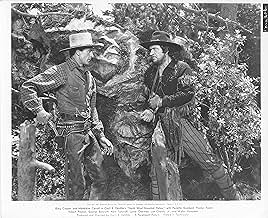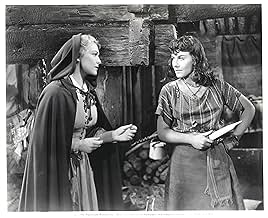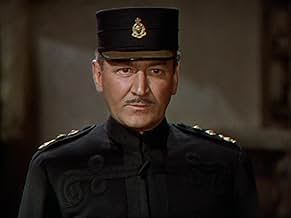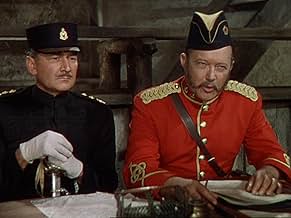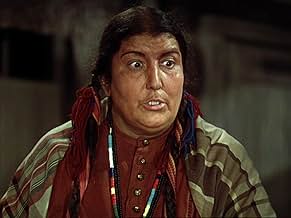CALIFICACIÓN DE IMDb
6.3/10
2 k
TU CALIFICACIÓN
En 1885, un ranger de Texas viaja a Canadá para arrestar a un cazador buscado por asesinato y que está incitando a los nativos a una rebelión contra el gobierno canadiense.En 1885, un ranger de Texas viaja a Canadá para arrestar a un cazador buscado por asesinato y que está incitando a los nativos a una rebelión contra el gobierno canadiense.En 1885, un ranger de Texas viaja a Canadá para arrestar a un cazador buscado por asesinato y que está incitando a los nativos a una rebelión contra el gobierno canadiense.
- Dirección
- Guionistas
- Elenco
- Ganó 1 premio Óscar
- 4 premios ganados y 4 nominaciones en total
Opiniones destacadas
I happened to see this last Sunday afternoon on the T.V. At first the film looked dated but the costumes and general appearance of the people in it convincingly portrayed people of that era (something that doesn't happen as often as it should in "Westerns"); it soon became apparent that things were being done rather well and by the time the credits came along and I saw the name of Cecil B DeMille I knew why.
This is an entertaining, undemanding film. There is a great deal to enjoy if one puts aside ones modern sophistication. I particularly enjoyed the way the mounties were portrayed as a dedicated and disciplined police force, loyal to the Crown and doing a worthwhile job in very difficult circumstances. Gary Cooper's Texas Ranger helped to highlight the qualities of the Mounties and provided interest and excitement.
Crowd scenes and action scenes are well done. The stunt towards the end involving Gary Cooper's character tumbling from his falling horse is breathtaking and the quick cut to a back projection immediately after is very effective; it is a scene that can match anything in today's films. Characters have interesting scenes and the humour is dealt with a sure touch. The film has all the signs of a good director.
I didn't expect to enjoy this film, but I did and I look forward to finding more from the same period.
This is an entertaining, undemanding film. There is a great deal to enjoy if one puts aside ones modern sophistication. I particularly enjoyed the way the mounties were portrayed as a dedicated and disciplined police force, loyal to the Crown and doing a worthwhile job in very difficult circumstances. Gary Cooper's Texas Ranger helped to highlight the qualities of the Mounties and provided interest and excitement.
Crowd scenes and action scenes are well done. The stunt towards the end involving Gary Cooper's character tumbling from his falling horse is breathtaking and the quick cut to a back projection immediately after is very effective; it is a scene that can match anything in today's films. Characters have interesting scenes and the humour is dealt with a sure touch. The film has all the signs of a good director.
I didn't expect to enjoy this film, but I did and I look forward to finding more from the same period.
this first demille color epic was a sensation in 1940, deep in the era of fitzpatrick traveltalks ("so as the sun sinks slowly behind the rugged rockies we bid a reluctant adieu to the friendly metis people of canada.") it surely has many fine moments. but the plot is somewhat convoluted and the hero keeps picking up different horses along the way. "the horse he rode in on" was 1500 miles from home (texas). we see a somewhat distorted map of canada at the opening. the pivotal town of batoche is situated too close to the US border, about where regina should be. regina isn't shown, despite continual reference to it throughout. demille isn't the best director for gary cooper, who was allowed to brandish his bizarre mannerisms in a duel to the finish with paulette goddard. the cool blonde madeleine carroll and stout fella preston foster were pleasant to see, but best acting was done by george bancroft as the heartless whiskey runner, jacques corbeau. best lines include one by montagu love as the mortally wounded inspector cabot: some fool at headquarters wants to change the uniform to green. stand up for the redcoats! it's a good color. and another colonialism from foster as sgt. brett to an indian chief: will big bear kneel to the queen and be chief of his people again? it was a valiant two hour fight, but the scenery won. bonus quote by lynne overman as scottish-indian todd macduff: do they have fast horses in texas, mr. rivers? i'm bettin' they can nae keep up wi' the men.
... but the director is Cecil B. DeMille, and given that DeMille helped build Paramount, it's not like the studio is going to deny even his worst impulses.
It's 1885, and the Metis (half-breed) people of western Canada are planning a rebellion, led by bad guys Corbeau (George Bancroft), Riel (Francis McDonald), and Duroc (Akim Tamiroff). Out to stop them are the stalwart men of the North West Mounted Police, led by the straight-backed Sgt. Jim Brett (Preston Foster). He bristles when he's forced to accept help from Texas Ranger Dusty Rivers (Gary Cooper), who has come north in search of a fugitive murderer. Both Brett and Rivers chase after angelic nurse April Logan (Madeleine Carroll). Meanwhile, young Mountie rake Ronnie Logan (Robert Preston) is conducting an illicit affair with half-breed wildcat Louvette (Paulette Goddard).
This is a big, loud mix of the dumb and the entertaining. It's bad but never boring, with outrageous characters sporting silly names ("Dusty Rivers"? Really?!?), tonally awkward scenes of slapstick comedy followed by people being shot in the head, and laughably misplaced romance. The gorgeous "Canadian" scenery was achieved primarily on LA soundstages, and the filmmakers never did make it to Canada, although there's some legitimate outdoor scenes shot in California state parks. However silly it all is, DeMille knew his formula well, as this ended up being Paramount's biggest hit of the year, as well as earning Oscar nominations for Best Score, Best Sound, Best Color Art Direction, and Best Color Cinematography, as well as winning for Best Editing.
Would it have gotten these accolades had the director NOT been De Mille? I doubt it.
It's 1885, and the Metis (half-breed) people of western Canada are planning a rebellion, led by bad guys Corbeau (George Bancroft), Riel (Francis McDonald), and Duroc (Akim Tamiroff). Out to stop them are the stalwart men of the North West Mounted Police, led by the straight-backed Sgt. Jim Brett (Preston Foster). He bristles when he's forced to accept help from Texas Ranger Dusty Rivers (Gary Cooper), who has come north in search of a fugitive murderer. Both Brett and Rivers chase after angelic nurse April Logan (Madeleine Carroll). Meanwhile, young Mountie rake Ronnie Logan (Robert Preston) is conducting an illicit affair with half-breed wildcat Louvette (Paulette Goddard).
This is a big, loud mix of the dumb and the entertaining. It's bad but never boring, with outrageous characters sporting silly names ("Dusty Rivers"? Really?!?), tonally awkward scenes of slapstick comedy followed by people being shot in the head, and laughably misplaced romance. The gorgeous "Canadian" scenery was achieved primarily on LA soundstages, and the filmmakers never did make it to Canada, although there's some legitimate outdoor scenes shot in California state parks. However silly it all is, DeMille knew his formula well, as this ended up being Paramount's biggest hit of the year, as well as earning Oscar nominations for Best Score, Best Sound, Best Color Art Direction, and Best Color Cinematography, as well as winning for Best Editing.
Would it have gotten these accolades had the director NOT been De Mille? I doubt it.
When Cecil B. DeMille started filming Northwest Mounted Police, Joel McCrea was Texas Ranger Dusty Rivers (a cowboy name if there ever was one), but after a few scenes McCrea dropped out and Gary Cooper got to do his second of four DeMille features.
It was both DeMille and Cooper's first film in technicolor and when DeMille went in for technicolor we mean bright hues of every part of the rainbow. But back then color itself was a novelty so people liked seeing it. Northwest Mounted Police also won an Oscar for best editing. Taking home the prize was Anne Bauchens who edited every single DeMille film from back into the middle silent era. DeMille had it written into his contract at Paramount that he would not do a film unless Ms. Bauchens was available to be editor. He had many of the same folks on his various films, but only Ms. Bauchens rated that kind of treatment.
Michael Medved has Northwest Mounted Police listed among the fifty worst films of all time. It's not great, but it ain't as bad as all that. The Victorian DeMille type dialog is the main reason, but it is no more present here than in any of his other sound films.
Northwest Mounted Police takes place in the mid 1880s and concerns the famous 2nd Louis Riel Rebellion and the Duck Lake massacre of Royal Canadian Mounted Police in that conflict. Grafted on to that is the story of a Texas Ranger played by Gary Cooper who comes up to Canada with a warrant for one of Riel's confederates who killed a man in his state.
Of course Cooper gets himself mixed up in the politics of the area and also considerably mixed up with Maddeleine Carroll, much to the displeasure of her sweetheart Preston Foster, as stalwart a Mountie as you'll ever find this side of Nelson Eddy. That's a standard DeMille plot device, two men in heat over the heroine.
In some considerable heat himself is Robert Preston who is Carroll's brother also a Mountie. He's got it bad for Paulette Goddard a Meti who's got it real bad for Preston. In fact her little scheme concerning Preston is what drives the action of the film in the second half.
DeMille was never an actor's director or a writer's director. But he knew how to fill the screen and keep the action going. That he does in Northwest Mounted Police.
It was both DeMille and Cooper's first film in technicolor and when DeMille went in for technicolor we mean bright hues of every part of the rainbow. But back then color itself was a novelty so people liked seeing it. Northwest Mounted Police also won an Oscar for best editing. Taking home the prize was Anne Bauchens who edited every single DeMille film from back into the middle silent era. DeMille had it written into his contract at Paramount that he would not do a film unless Ms. Bauchens was available to be editor. He had many of the same folks on his various films, but only Ms. Bauchens rated that kind of treatment.
Michael Medved has Northwest Mounted Police listed among the fifty worst films of all time. It's not great, but it ain't as bad as all that. The Victorian DeMille type dialog is the main reason, but it is no more present here than in any of his other sound films.
Northwest Mounted Police takes place in the mid 1880s and concerns the famous 2nd Louis Riel Rebellion and the Duck Lake massacre of Royal Canadian Mounted Police in that conflict. Grafted on to that is the story of a Texas Ranger played by Gary Cooper who comes up to Canada with a warrant for one of Riel's confederates who killed a man in his state.
Of course Cooper gets himself mixed up in the politics of the area and also considerably mixed up with Maddeleine Carroll, much to the displeasure of her sweetheart Preston Foster, as stalwart a Mountie as you'll ever find this side of Nelson Eddy. That's a standard DeMille plot device, two men in heat over the heroine.
In some considerable heat himself is Robert Preston who is Carroll's brother also a Mountie. He's got it bad for Paulette Goddard a Meti who's got it real bad for Preston. In fact her little scheme concerning Preston is what drives the action of the film in the second half.
DeMille was never an actor's director or a writer's director. But he knew how to fill the screen and keep the action going. That he does in Northwest Mounted Police.
Cecil B. DeMille's fame as a leading movie director is still secure because of his innovative nature. He certainly developed spectacle movies, and even today he is remembered as the pioneer. But that does not blind us to his flaws. His characters are not three dimensional usually but black or white in personality. His dialog is for the birds. He does fall into stereotypes too often. It is understandable that the Medveds included "Northwest Mounted Police" among the 50 worst movies ever made.
Yet one can't easily dismiss it. It was DeMille's first color movie. It was the second of four films with Gary Cooper, one of four made Goddard and one of three made with Robert Preston. Preston made good action films in this period but was always in support. In the early 1950s he returned to the stage and the fame that eluded him in Hollywood. Came "The Music Man", "The Lion In Winter", and "Mack and Mabel" and the recognition of Preston the adept entertainer. Came the call back to Hollywood for his filmed performances as Harold Hill and Toddy (in "Victor/Victoria"). Preston was that rarity: an actor who proved his star qualities in middle-age. DeMille would never have been his kind of director: he had no light touch for comedy, and he did not do musicals. Still, for some good straight performances as doomed weaklings, Preston did well in this film,"Union Pacific", and "Reap the Wild Wind".
The film's historic content is interesting. DeMille's earlier historic films ("Cleopatra", "Sign of the Cross", "The Crusades") dealt with old world history. But after the last DeMille concentrated on American history with "The Plainsman", "The Buccaneer", "Union Pacific", "Reap The Wild Wind", and "The Unconquered". Even the modern "The Story of Dr. Wassell" was based on a true tale connected with the current war in the Pacific.
Because of his American History period "Northwest Mounted Police" is an odd film. Cooper's character is the only link in it to American history in the 1880s, as a Texas Ranger after George Bancroft (Le Corbeau) for murder. The film is set firmly in Canada which was the scene of two revolts of the Metis people under Louis Riel in 1870 and 1885. As such this becomes somewhat unique among the historic films of Hollywood.
Canada does poorly regarding it's history in Hollywood. This movie actually covers one of the most troubling moments of modern Canadian history: the fate of Louis Riel. We don't know about it down here. Riel was a lawyer and teacher with some mental problems. Riel helped found the provinces of Manitoba and Saskatchewan, thus making him one of Canadian history's founding fathers. But he was also aware that French Canadians and his Metis people got a suspiciously short deal from the British Canadians in Canada. Canada was firmly controlled by the Tory party led by Sir John MacDonald. MacDonald was corrupt but made one of the great comebacks in political history in 1879. Riel had led a revolt in 1870 which was crushed. He fled to the U.S., and spent some time in asylums here. He was released, taught school in Montana, and then returned to Canada (illegally) in 1884. He organized a second Metis revolt, which nearly succeeded in winning an independent state. A British army crushed it in 1885, captured Riel, and he was tried for treason.
Lives had been lost, and property destroyed. MacDonald's son had been sent to Manitoba to run the province, and he had been humiliated by the revolt. Riel, however, had some legitimate gripes about the treatment of French Canadians, and the Metis. The treason trial came, and he was found guilty. MacDonald apparently never had a moment's hesitation about what to do. He refused to stop Riel's execution. The Tory Party in Canada has never recovered from this mistake. The backbone of Liberal Party strength (to the current day) is French Canadien Quebec - they have never forgiven the Tories for not acting humanely to Louis (and putting him in a Canadian asylum for life).
DeMille is not totally anti-Riel. Riel is not unlike the American John Brown (inthe contemporary film "Santa Fe Trail"), who is murderous and possibly insane but fighting for certain principles that actually get the audience's sympathy. In this film, Riel is committed to a Metis revolt and state and he will stop at nothing to prevent it's success. But he also is shown as a kindly man to young children (he was a school teacher, remember).He is trying to save a way of life that a juggernaut threatens. And he is resigned to his fate at the end, realizing that in dying he may still win (which happened). We need a subsidiary villain like Van Heflin in "Sante Fe Trail" who is villainous for money. Here it is Bancroft, a murderer and criminal who is Riel's assistant. His villainy is passed down through his genes to his daughter (Goddard) who tempts and betrays Preston. One wonders, had Riel formed a successful government and state, how long before Le Corbeau would have arranged an "accident" or "assassination" (by a "Tory" agent, of course) of Riel, in order to cement his control over the Metis nation. So when he gets his just deserts at the end, unlike poor Louis, we are cheered by it. One has to congratulate DeMille in trying to be fair to Louis, when he could have just made his a super villain.
Yet one can't easily dismiss it. It was DeMille's first color movie. It was the second of four films with Gary Cooper, one of four made Goddard and one of three made with Robert Preston. Preston made good action films in this period but was always in support. In the early 1950s he returned to the stage and the fame that eluded him in Hollywood. Came "The Music Man", "The Lion In Winter", and "Mack and Mabel" and the recognition of Preston the adept entertainer. Came the call back to Hollywood for his filmed performances as Harold Hill and Toddy (in "Victor/Victoria"). Preston was that rarity: an actor who proved his star qualities in middle-age. DeMille would never have been his kind of director: he had no light touch for comedy, and he did not do musicals. Still, for some good straight performances as doomed weaklings, Preston did well in this film,"Union Pacific", and "Reap the Wild Wind".
The film's historic content is interesting. DeMille's earlier historic films ("Cleopatra", "Sign of the Cross", "The Crusades") dealt with old world history. But after the last DeMille concentrated on American history with "The Plainsman", "The Buccaneer", "Union Pacific", "Reap The Wild Wind", and "The Unconquered". Even the modern "The Story of Dr. Wassell" was based on a true tale connected with the current war in the Pacific.
Because of his American History period "Northwest Mounted Police" is an odd film. Cooper's character is the only link in it to American history in the 1880s, as a Texas Ranger after George Bancroft (Le Corbeau) for murder. The film is set firmly in Canada which was the scene of two revolts of the Metis people under Louis Riel in 1870 and 1885. As such this becomes somewhat unique among the historic films of Hollywood.
Canada does poorly regarding it's history in Hollywood. This movie actually covers one of the most troubling moments of modern Canadian history: the fate of Louis Riel. We don't know about it down here. Riel was a lawyer and teacher with some mental problems. Riel helped found the provinces of Manitoba and Saskatchewan, thus making him one of Canadian history's founding fathers. But he was also aware that French Canadians and his Metis people got a suspiciously short deal from the British Canadians in Canada. Canada was firmly controlled by the Tory party led by Sir John MacDonald. MacDonald was corrupt but made one of the great comebacks in political history in 1879. Riel had led a revolt in 1870 which was crushed. He fled to the U.S., and spent some time in asylums here. He was released, taught school in Montana, and then returned to Canada (illegally) in 1884. He organized a second Metis revolt, which nearly succeeded in winning an independent state. A British army crushed it in 1885, captured Riel, and he was tried for treason.
Lives had been lost, and property destroyed. MacDonald's son had been sent to Manitoba to run the province, and he had been humiliated by the revolt. Riel, however, had some legitimate gripes about the treatment of French Canadians, and the Metis. The treason trial came, and he was found guilty. MacDonald apparently never had a moment's hesitation about what to do. He refused to stop Riel's execution. The Tory Party in Canada has never recovered from this mistake. The backbone of Liberal Party strength (to the current day) is French Canadien Quebec - they have never forgiven the Tories for not acting humanely to Louis (and putting him in a Canadian asylum for life).
DeMille is not totally anti-Riel. Riel is not unlike the American John Brown (inthe contemporary film "Santa Fe Trail"), who is murderous and possibly insane but fighting for certain principles that actually get the audience's sympathy. In this film, Riel is committed to a Metis revolt and state and he will stop at nothing to prevent it's success. But he also is shown as a kindly man to young children (he was a school teacher, remember).He is trying to save a way of life that a juggernaut threatens. And he is resigned to his fate at the end, realizing that in dying he may still win (which happened). We need a subsidiary villain like Van Heflin in "Sante Fe Trail" who is villainous for money. Here it is Bancroft, a murderer and criminal who is Riel's assistant. His villainy is passed down through his genes to his daughter (Goddard) who tempts and betrays Preston. One wonders, had Riel formed a successful government and state, how long before Le Corbeau would have arranged an "accident" or "assassination" (by a "Tory" agent, of course) of Riel, in order to cement his control over the Metis nation. So when he gets his just deserts at the end, unlike poor Louis, we are cheered by it. One has to congratulate DeMille in trying to be fair to Louis, when he could have just made his a super villain.
¿Sabías que…?
- TriviaCecil B. DeMille initially thought Paulette Goddard was all wrong for the role of the half-breed Indian girl. Marlene Dietrich, Vivien Leigh, Katherine DeMille, Simone Simon, Anna Sten, Olympe Bradna, and Steffi Duna were considered for the part, but when Goddard showed up in his office in costume and make-up speaking pidgin English, he cast her.
- ErroresJust before heading out to find Corbeau, Rivers helps April up onto her wagon. A few minutes later we see her climb up again, on her own.
- Citas
Dusty Rivers: Down where I come from we don't jump to conclusions. It's liable to be a feller's last jump.
- Versiones alternativasThe UK DVD is cut by 6 secs with edits to cruel horsefalls.
- ConexionesFeatured in Cecil B. DeMille: American Epic (2004)
Selecciones populares
Inicia sesión para calificar y agrega a la lista de videos para obtener recomendaciones personalizadas
- How long is North West Mounted Police?Con tecnología de Alexa
Detalles
- Fecha de lanzamiento
- País de origen
- Idioma
- También se conoce como
- North West Mounted Police
- Locaciones de filmación
- Productora
- Ver más créditos de la compañía en IMDbPro
- Tiempo de ejecución
- 2h 6min(126 min)
- Relación de aspecto
- 1.37 : 1
Contribuir a esta página
Sugiere una edición o agrega el contenido que falta

